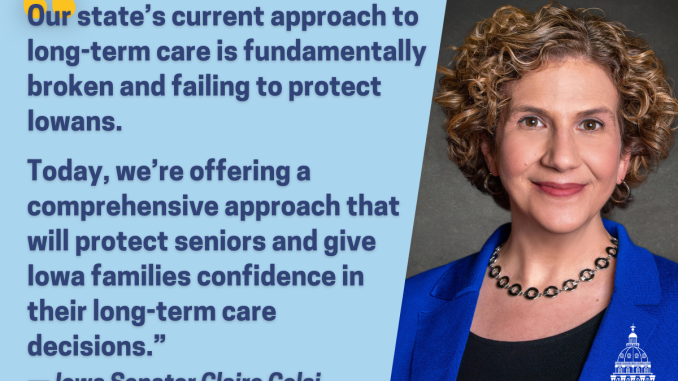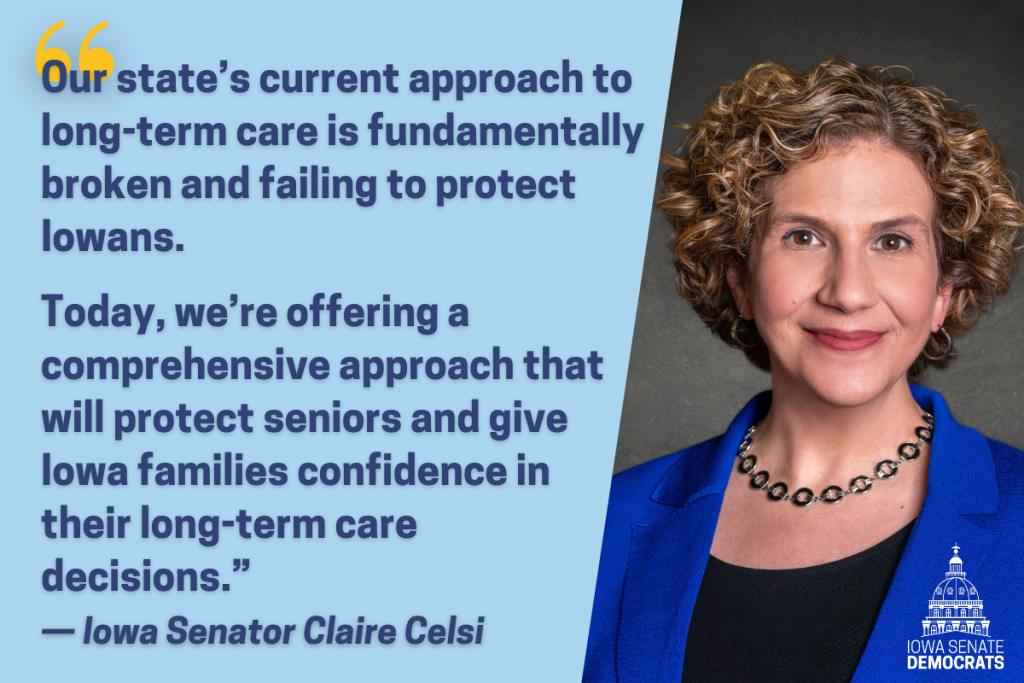

Des Moines — Iowa Senate Democrats on Tuesday introduced a new package of legislation to ensure safety, support, and accountability in Iowa nursing homes and long-term care facilities.
The legislative package includes four bills that provide a comprehensive approach to address the crisis of abuse and neglect in Iowa long-term care. Taken together, these bills will improve care and expand options for Iowa seniors while ensuring facilities have the support needed to thrive.
“The stories we’ve been hearing about understaffing, abuse, neglect and an overall lack of accountability in Iowa nursing homes are devastating – and unacceptable,” Sen. Claire Celsi, D-West Des Moines, said. “Our state’s current approach to long term care is fundamentally broken and failing to protect Iowans. Today, we’re offering a comprehensive approach that will protect seniors and give Iowa families confidence in their long-term care decisions.”
At the center of the package is Senate File 2304, which increases oversight and requires new transparency and accountability standards for long-term care facilities – ensuring regulators can adequately monitor nursing homes, enforce state law, and issue meaningful penalties for violations to help ensure residents are better protected.
“Iowans deserve safe, high-quality care that allows them to live their best lives and age with dignity in our long-term care facilities, but also at home and in their communities.” Sen. Janice Weiner, D-Iowa City, said. “Senate Democrats are introducing this comprehensive package of legislation to provide seniors with the safeguards, options, and accountability, no matter what kind of care they choose.”
Other elements of the package include legislation expanding alternatives to nursing-home care for Iowa seniors; increasing pay for direct-care workers to address staffing issues, and increasing the personal needs allowance provided to residential care facility residents through Medicaid.
Iowa is one of the worst-performing nursing home states in the nation, and legislative action is essential to fix it. According to federal nursing home data, Iowa is responsible for more than 4 percent of the nation’s immediate jeopardy and life threatening situations, despite accounting for just 1 percent of the nation’s 65+ population. Ultimately, state agencies are responsible for enforcing nursing-home safety standards, but they are currently failing to do so – with tragic consequences as a result.
The long-term care package is part of Senate Democrats’ Better Deal for Iowans agenda for 2024. Senate Democrats are listening to the needs of Iowans and introducing legislation to ensure accountability in our state government. Nowhere is accountability more urgent today than in Iowa nursing homes.
More about the package:
Oversight, Transparency, and Accountability in Long-Term Care: SF 2304
- This bill creates a new Long Term Care Facility Safety Council, adding citizen review and input into the Department of Inspections, Appeals, and Licensing’s oversight of Iowa’s lowest performing care facilities.
- The bill requires more regular facility inspections and stiffer penalties for violations, and hires 30 additional nursing home inspectors.
Alternatives to Institutional Long-Term Care: SF 2306
- The bill launches a robust study of alternatives to institutional long-term care led by a group of advocates. The study will review innovative models for elder care in effect in other states and identify paths forward for Iowa
- This bill invests in alternatives to institutional care, including home health care, adult day care, and dementia care specialists to enable Iowa seniors to stay at home.
- The bill also expands the Return to Community pilot program to provide coordinated care for Iowans following hospitalization so they can return home, rather than enter and remain in an institutional care facility.
Supporting the Direct Care Workforce: SF 2305
- This bill establishes a $15/hour minimum wage for direct-care workers that will rise to $20/hour over a period of years and then match inflation. Increasing the wage offered to direct care workers will help attract direct care workers to Iowa, and encourage younger Iowans to consider entering the profession. The minimum wage is contingent on Medicaid reimbursement rate increases.
Ensuring Independence and Self Care for Residents: SF 2303
- The Iowa Medicaid program currently includes a $50/month personal needs allowance for long-term care residents who rely on Medicaid. That allowance has stayed the same for 20 years, despite rising costs of living. This bill raises the allowance to $85/month, allowing residents to purchase self-care items and live more independently in long term care facilities.
###
